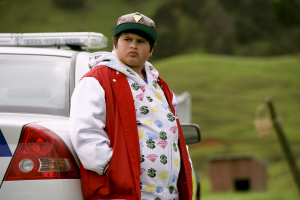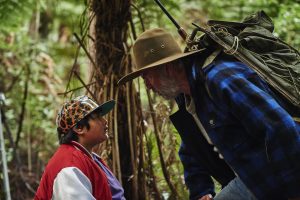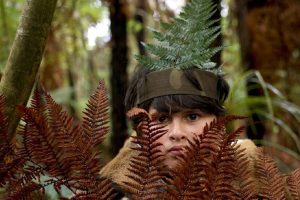![]()
If you like deadpan humor, have I got the picture for you. Hunt for the Wilderpeople is the latest from New Zealand filmmaker Taika Waititi, who previously brought us the hilarious What We Do in the Shadows. This comedy/drama carries a decidedly different feel than his previous film. However, while it is a peculiar and subdued effort more in tone with the director’s earlier efforts like Eagle vs Shark (2007), the end result is still extremely charismatic and enjoyable in its own right.
 Ricky Baker (Julian Dennison) is a lonely city kid moving from juvenile center to juvenile center. Despite his general awkwardness, he postures himself after his favorite “gangsta” rappers. Ricky is less-than-thrilled when he’s sent to a foster home on a farm in the remote bush. While his foster parents Hec (Sam Neill) and Paula (Rachel House) are (to put it mildly) extremely eccentric, Ricky slowly adapts. When child protection services decide to take the boy back, he runs away into the wilderness. With a cantankerous Hec in pursuit, a series of misadventures follow. It isn’t long before authorities mistakenly believe that Ricky has been kidnapped by his foster dad.
Ricky Baker (Julian Dennison) is a lonely city kid moving from juvenile center to juvenile center. Despite his general awkwardness, he postures himself after his favorite “gangsta” rappers. Ricky is less-than-thrilled when he’s sent to a foster home on a farm in the remote bush. While his foster parents Hec (Sam Neill) and Paula (Rachel House) are (to put it mildly) extremely eccentric, Ricky slowly adapts. When child protection services decide to take the boy back, he runs away into the wilderness. With a cantankerous Hec in pursuit, a series of misadventures follow. It isn’t long before authorities mistakenly believe that Ricky has been kidnapped by his foster dad.
In actuality, the subject matter is quite dark. Yet in spite of the seriousness of their plight, there’s a great deal of amusing banter early on that effectively sets an off-kilter mood. Awkward conversations between the characters, a wonky tune sung for Ricky’s birthday, a bizarre sermon from a local minister (played by the film’s director) and eventually some interactions with locals all help emphasize the absurdity of the situations the two main characters find themselves in.
 This isn’t the most original story in the world, so the film rests entirely on the shoulders of its two leads. Thankfully, they are more than up to the challenge. Neill is always compelling and it’s interesting to see him take on a gruff, Crocodile Dundee-type character. Youngster Dennison really excels as the likable, clumsy kid who couldn’t look more out of place if he tried. He varies effortlessly between posturing, blank stares, pratfalls, quirky affectations (like composing bizarre haiku poems) and showing hints of sadness at his unfortunate lot in life. It is a very difficult line to tread, but somehow the film finds a solid balance.
This isn’t the most original story in the world, so the film rests entirely on the shoulders of its two leads. Thankfully, they are more than up to the challenge. Neill is always compelling and it’s interesting to see him take on a gruff, Crocodile Dundee-type character. Youngster Dennison really excels as the likable, clumsy kid who couldn’t look more out of place if he tried. He varies effortlessly between posturing, blank stares, pratfalls, quirky affectations (like composing bizarre haiku poems) and showing hints of sadness at his unfortunate lot in life. It is a very difficult line to tread, but somehow the film finds a solid balance.
Split into chapters, the movie does have a somewhat episodic feel. As such, some segments work a little better than others. Occasionally, the odd joke is a bit too broad for its own good. But even when it isn’t hilarious, the actors are consistently engaging. And considering the small, character-based nature of the story, this movie looks surprisingly grand. The New Zealand bush is gorgeous to behold and the camera captures it with impressive widescreen photography. Backdrops look extraordinary on the big screen and the striking images add a lot of production value to the presentation.
 Deep down this is a story about two very different kinds of outcasts on a hopeless journey to avoid capture and essentially be left alone in the wild; they’re a pair of loners who despite their differences, slowly begin to find affection and solace in each other’s company. Amazingly enough, the feature never resorts to false sentimentality to achieve its goals. It may take some viewers a while to get on the movie’s wavelength, but once one finds it, this tale is thoroughly engaging and stays with you long after the credits roll. Hunt for the Wilderpeople is sweet without being syrupy and quirky without feeling forced or grating. In the end, it’s almost impossible to resist the movie’s oddball charms.
Deep down this is a story about two very different kinds of outcasts on a hopeless journey to avoid capture and essentially be left alone in the wild; they’re a pair of loners who despite their differences, slowly begin to find affection and solace in each other’s company. Amazingly enough, the feature never resorts to false sentimentality to achieve its goals. It may take some viewers a while to get on the movie’s wavelength, but once one finds it, this tale is thoroughly engaging and stays with you long after the credits roll. Hunt for the Wilderpeople is sweet without being syrupy and quirky without feeling forced or grating. In the end, it’s almost impossible to resist the movie’s oddball charms.


